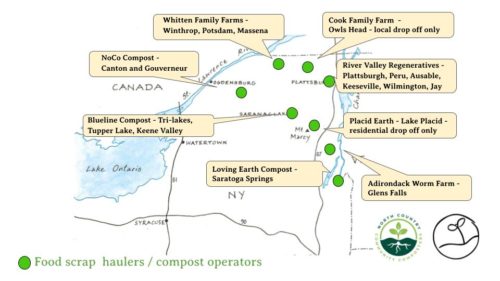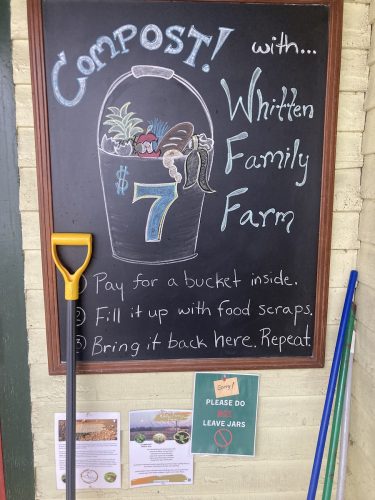

FOR IMMEDIATE RELEASE
Date: January 9, 2025
Contact: Audrey Schwartzberg, ANCA Communications Director, [email protected], 518.891.6200
North Country Groups Applaud State’s Expansion of Food Waste Reduction Law
ANCA, Clarkson and the Authority offer support for local food scraps management and composting efforts
SARANAC LAKE, N.Y. — Last month, Governor Kathy Hochul announced amendments to New York State’s Food Donation and Food Scraps Recycling law, which aims to reduce the amount of wasted food that ends up in landfills while increasing food access for all New Yorkers. Among other regional groups advancing composting efforts in the North Country, Compost for Good (CfG), a program of the Adirondack North Country Association (ANCA), Clarkson University, and the Development Authority of the North Country (the Authority) applaud the act’s expansion. The groups are offering support for affected businesses and communities so they may better understand and comply with the law.
In response to the amendments, the partners aim to expand their education and outreach efforts to more North Country residents, businesses, farmers, institutions, and organizations in order to reduce the amount of food scraps and other organic materials in landfills by converting them to beneficial compost for use on local farms and gardens.
“By reducing the threshold of waste generation rates by businesses, the law will transition from requiring compliance by large grocery stores and college and university campuses to now also impacting many more small and moderate-size grocery stores and many restaurants in our region,” said Dr. Susan E. Powers, Director of Clarkson University’s Institute for a Sustainable Environment.
Jennifer Perry, ANCA Organics Recycling Coordinator and co-founder of CfG said, “Diverting food scraps from our already overburdened landfills is one of the easiest ways to reduce greenhouse gas emissions while simultaneously feeding people, saving money, building local business opportunities and creating compost that builds soil health and increases plants’ capacity to sequester carbon. It’s an all around win.”
Perry said community and business leaders are invited to contact Compost for Good to learn about local community-scale composting resources, food waste reduction educational programs, and a growing number of regional composting businesses that collect food scraps and turn them into compost.
New York’s Food Donation and Food Scraps Recycling law was enacted in 2022 and mandated that entities producing two tons or more of food waste per week are obligated to donate or divert their scraps to a food pantry, farm, or composting facility if there are any located within 25 miles of their site. The New York State Department of Environmental Conservation (NYSDEC) publishes an annual list that included hundreds of food waste generators that were expected to comply. The amendments signed by the governor will increase the radius from 25 miles to 50 and decrease the food waste threshold from two tons to one ton by the end of 2025, and then to 500 pounds by the end of 2027.
In a recent statement, national environmental law nonprofit Earthjustice estimates the new qualifications will increase the amount of recycled food scraps by 42 percent, and reduce carbon emissions generated from landfilled food waste by thousands of metric tons of carbon dioxide equivalency annually. According to the U.S. Environmental Protection Agency, currently about 30 to 40 percent of food in the U.S. is thrown away, with approximately 21 percent of the municipal solid waste stream consisting of this wasted food. When buried, these scraps produce methane, a highly potent greenhouse gas.
Since its founding in 2019 and with administrative support from AdkAction and ANCA, CfG has built a robust network of regional partners including Clarkson University, the Authority, the Clinton County Health Department, NYSDEC, and other organizations that are invested in reducing food waste in the North Country and converting organic waste into valuable, nutrient-rich compost.
New York State Association for Reduction, Reuse and Recycling (NYSAR3) President Gary Carrel also applauds the expansion of the act. “This will not only help create more opportunities for composting, but also provide vital food donations to those in need,” he said. “Furthermore, this update will enhance the business of composting which will have positive economic impacts, while reducing the negative impacts of the food scraps waste stream on our environment.”
Clinton County Health Department Supervising Public Health Educator Kayleigh Raville said, “The phased implementation over the next three years will give businesses and recycling partners time to adopt sustainable food waste management practices. Our team is eager to continue supporting Clinton County generators to develop plans to meet these goals.”
CfG, Clarkson University, the Authority and partners are committed to helping businesses and communities develop food waste reduction solutions. Interested entities are invited to contact ANCA Organics Recycling Coordinator Jennifer Perry at [email protected] to set up a free consultation and visit ANCA’s North Country Community Composting Coalition (N4C) webpage for a list of local food scrap haulers and community composters.
Perry said she can also connect residents, businesses and community leaders with other North Country resources including: Clinton County Health Department’s Eat Smart Waste Less Program, which offers support for businesses in Clinton County interested in reducing food waste; Clarkson/ANCA Community Compost Liaisons who will soon be offering community education campaigns and food waste audits for businesses in Clinton, Essex, Franklin and St. Lawrence counties; NYSDEC’s resources for compliance and reports on the impacts including the 2025 large-scale generator list; and the Development Authority of the North Country, which offers support and resources to entities in the western portions of the North Country.
ANCA is an independent, nonprofit corporation with a transformational approach to building prosperity across northern New York. Using innovative strategies for food systems, clean energy, small businesses, and equity and inclusion, ANCA delivers targeted interventions that create and sustain wealth and value in local communities.
Clarkson University is a proven leader in technological education, research, innovation and sustainable economic development. Clarkson faculty have a direct impact on more than 7,800 students annually through nationally recognized undergraduate and graduate STEM designated degrees in engineering, business, science and health professions; executive education, industry-relevant credentials and K-12 STEM programs. To learn more go to www.clarkson.edu.
Attached: two (2) images
- The North Country Community Composting Coalition (N4C) includes local businesses that work closely with Compost for Good to help residents, businesses and communities convert food scraps to compost.
- Whitten Family Farm in Winthrop, N.Y. is one of several North Country farms and businesses that provide community composting services.
###


